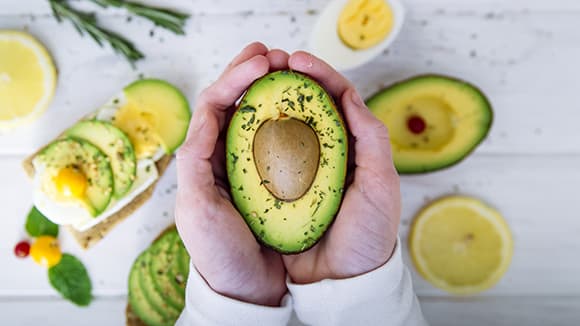What did one avocado say to the other?
‘You may be fat, but you’re the good kind,’ and other lessons about healthy fats.
Article Date:

Not all fats are created equal.
For years, popular diets told us to banish the four-letter word from our vocabulary – and our plates. But, studies show healthy fats can actually extend our lives by strengthening bone health, improving brain function and building a stronger immune system.
In fact, the United States Department of Agriculture dietary guidelines for Americans say fats are no longer taboo, but they do encourage replacing the saturated variety with healthy options.
But remember, all good things must come in moderation. One Baptist Health dietitian dishes all the details.
What is a healthy fat and where do you find it?
Ideally, you'll want to consume minimally processed foods that are rich in unsaturated fatty acids (say hello to your new BFF, omega-3s), said Jennifer Coalson, RDN, a registered dietitian with Baptist Health's employee wellness program, Healthy for Life.
Polyunsaturated fats
Sources of omega-3 fatty acids include walnuts, flaxseeds, canola oil and fish, such as salmon and sardines. Omega-6 fatty acids – linked to protection against heart disease – can be found in sunflower, soybean and corn oils. A word of caution: While potentially beneficial when consumed in moderation, excessive consumption of omega-6 fatty acids may increase the risk of some diseases, such as heart attack and stroke.
Monounsaturated fats
Olive oil, which contains mainly monounsaturated fat, forms the basis of the Mediterranean diet, often labeled the world's healthiest diet. Other than olive oil, monounsaturated fats can be found in avocados and most nuts, along with sunflower, canola and peanut oils.
To help incorporate these fats into your diet, try replacing butter or shortening with olive or avocado oil when cooking. You can also try snacking on nuts instead of pork rinds or snack cakes.
Out with the bad fats, in with the good fats
Fats should not be avoided, but we should understand that consuming the wrong type in excess may increase the risk of heart disease or stroke, according to Coalson.
And, she added, healthy fats are only one component of a healthy diet. Their benefits are optimized when coupled with a plant-focused diet that includes vegetables, fruits, whole grains and lean protein sources. In fact, we need fats to absorb the fat-soluble vitamins (A, D and K) in our leafy greens and other vegetables. So, don't be afraid of full-fat salad dressings! Just look for options with an unsaturated oil (like olive or avocado).

9 fatty 'superfoods'
1. Avocado
Avocado is rich in monounsaturated fats that support heart health.
2. Eggs
Eggs provide healthy fats, particularly in the yolk, which include monounsaturated and polyunsaturated fats.
3. Fish
Fish like salmon, mackerel, sardines, trout and herring are excellent sources of omega-3 fatty acids, which support heart and brain health.
4. Low-fat Greek yogurt
Low-fat Greek yogurt contains both saturated and monounsaturated fats along with protein.
5. Nuts and nut butters
Nut butters, like almond butter and peanut butter, offer monounsaturated and polyunsaturated fats, along with protein. Almonds, walnuts, pistachios and cashews are also great sources of monounsaturated and polyunsaturated fats.
6. Oil
Olive, flaxseed and avocado oil contain various healthy fats, including monounsaturated fats in avocado oil.
7. Seeds
Seeds, including chia, flaxseeds and pumpkin, offer omega-3 and omega-6 fatty acids, supporting heart health.
8. Soybeans
Soybeans contain polyunsaturated fats, including omega-3 and omega-6 fatty acids.
9. Tofu
Tofu is a source of primarily polyunsaturated fats.
What do fats do for our bodies?
Uses of fats within the body are wide-ranging. Healthy fats:
- Provide a source of energy
- Protect our organs
- Form part of every cell membrane in our body
- Help with hormone production
- Allow for absorption of many necessary vitamins
- Contribute to the development of the brain and central nervous system (in babies)
- Lower cholesterol
Cholesterol, a waxy substance made by the liver, has two main forms: LDL and HDL. LDL is often referred to as the "bad cholesterol," while HDL is often called "the good cholesterol." Contrary to what you might hear, healthy fats in the diet promote lower LDL cholesterol levels and maintain better HDL levels, reducing the risk of heart disease.
But the added perk of fats? They're filling.
People end up eating less at each meal, which can help contribute to weight maintenance or loss. A study published in 2021 showed that eating a serving of nuts daily in addition to a diet high in fruits and vegetables led to better weight management and less weight regain.
Which fats should I avoid?
Trans-fats
The worst kind of dietary fat is trans-fat, the byproduct of a process called hydrogenation that turns healthy oils into solids for a longer shelf life. To spot these fats on a nutrition label, look for "partially hydrogenated oils" in the ingredient list.
Trans-fats used to be found mainly in solid margarine and vegetable shortening, but now appear in everything from store-bought cookies to fast-food French fries.
Eating foods high in trans-fats does the opposite of healthy fats, increasing the amount of bad cholesterol and reducing the good. They create inflammation, often linked to heart disease, stroke and diabetes. Even in small amounts, trans-fats increase the risk of chronic health conditions.
Saturated fat
The other fat to minimize is saturated fat, which is naturally solid at room temperature. Think butter, beef fat, shortening and the skin on chicken and other poultry. To reduce your intake, use butter where you can taste it (like on toast) instead of cooking with it, trim off the excess fat on meats, and use a heart-healthy oil in place of shortening when possible!
More ways to get healthy with Baptist Health
If you're looking to improve your overall wellness, you can request a free health screening from one of the Baptist Wellness Centers. We also offer health coaching, classes and more.
Source: National Library of Medicine study on adherence to a plant-based diet



